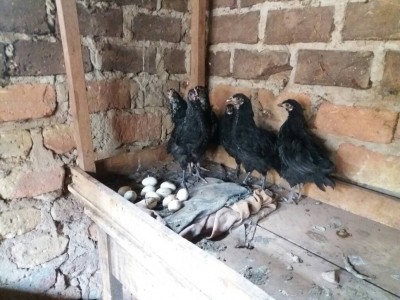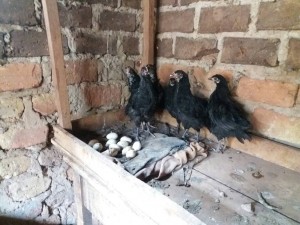Kikondo, UG – Wamukisa combines existing infrastructure with management processes to create new value – 26 Jun 2017
 Wamukisa is combining existing infrastructure at their farm with best practice management processes to continue moving towards sustainable self-reliance. The team cleared out an existing storage building and turned it into a chicken coop, which they will use to start a business selling eggs.
Wamukisa is combining existing infrastructure at their farm with best practice management processes to continue moving towards sustainable self-reliance. The team cleared out an existing storage building and turned it into a chicken coop, which they will use to start a business selling eggs.
Wamukisa staff members have been wanting to start a business selling eggs for a long time. Through their work with Better Lives they learned important lessons about raising chickens organically in the tropics. This includes techniques like making organic feed and supplements, maintaining a sanitary chicken coop, and planning for the rotation of chickens to maintain egg production. They also learned management procedures to help them design, operate, maintain, and improve the project. Manager Michael Kiwanuka wanted to use the chicken coop business as an opportunity to illustrate best practices for his team.
The team members started off by setting a SMART Goal of selling at least 50 eggs per day by the end of June 2018. They set this target because they know they have buyers ready to purchase this quantity of eggs each day. Wamukisa will need to keep 100 egg-laying chickens in their coop to ensure they have at least 50 eggs per day to sell. With these targets in mind, they set about discussing the People, Process, and Parts they would need to bring the project to fruition.
People
Michael Kiwanuka (Wamukisa’s manager) and Rose Nakato (community relations lead) both have the skill, will, and understanding necessary to manage the project together. Michael is in charge of planning, Rose is in charge of doing the work, Michael checks the work, and they act together to make improvements.
Process
Michael and Rose combined what they learned from Better Lives with their knowledge of local practices to create a weekly schedule for feeding, cleaning, and collecting eggs. They also thought through long-term process of growing the project, including targets for how many roosters to keep and how many new chicks they should target to hatch each month.
Parts
With their processes established, Michael and Rose were able to easily review each process step and agree what tools and materials they would need to carry out the activity. Some of the tools they purchased for the project include drinking fountains, egg-laying boxes, and a broom. They also set improvement objectives for parts they could purchase later, like saw-dust to line the floor to reduce cleaning work and improve sanitation.
Michael and Rose also considered Lowest Total Cost of Ownership when selecting parts for this project. With Lowest TCO in mind they decided to raise local chickens, not hybrid or foreign breed chickens. The local chickens are hardier, do not require inorganic supplements, and do not require special food. The birds have a lower total egg-production capacity, but Michael and Rose agreed that they reduced risk and would also be a more sustainable solution for local families hoping to learn from Wamukisa’s activities.
With a SMART Goal and a holistic design in mind, Wamukisa is moving forward with confidence and energy. “This is a very exciting activity for us,” said Michael, “It is really making us feel like we are learning and now we are growing on our own.”

